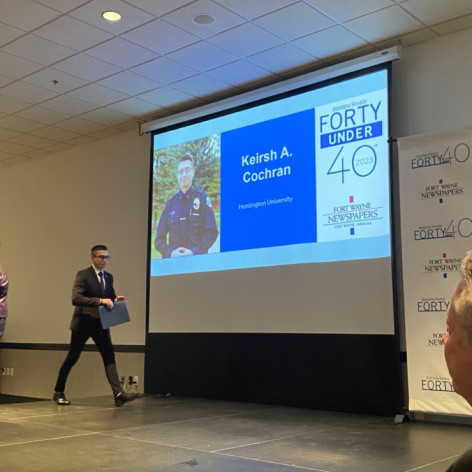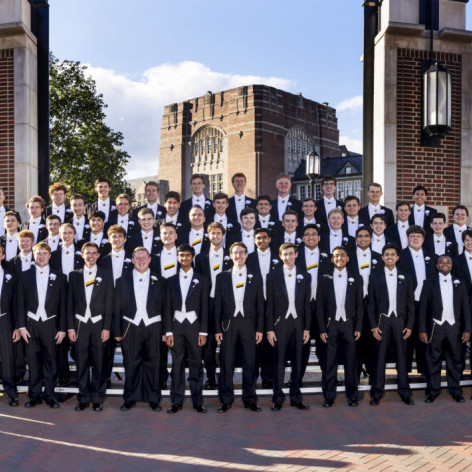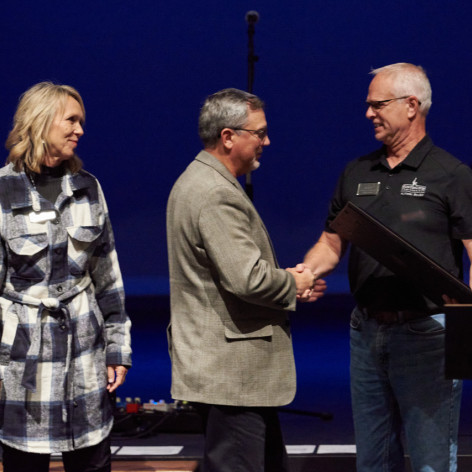Huntington graduate featured as Outstanding Alum
FOR RELEASE: Wednesday, October 5, 2005
Huntington, Ind. " To celebrate the sixth annual Christian Higher Education Month (October 2005), the Council for Christian Colleges & Universities has created a web site exclusively to showcase the significant contributions Christian colleges and their alumni are making to society. This site offers profiles of outstanding alumni from CCCU member institutions, stories on trends in Christian higher education and a complete online media kit including downloadable logos. One such outstanding alum featured is Brian Barnes, a 1998 Huntington University graduate. A native of Winchester, Ind., Barnes graduated from Huntington with a Bachelor of Science degree in exercise science. Of outstanding alumni nominees submitted by 105 member institutions, the CCCU chose 21 individuals to honor to during the month of October. Those stories are showcased at www.cccu.org/chem.
Nominees were chosen in five fields of expertise: government and law, arts and entertainment, global impact, science and technology, and business. The following profile of Brian Barnes is featured on the CCCU web site.
Brian Barnes
Fighting on a cellular level
As an active-duty captain in the U.S. Army, Brian Barnes's work does not address terrorist cells, but cells which are even closer to home. The field where he works from 7:30 a.m. to 5 p.m. every day is inside the body of the U.S. soldier.
Barnes is a scientist working with the U.S. Army Research Institution for Environmental Medicine in Massachusetts, whose research is aimed at improving the life of soldiers during times of extreme stress such as combat. More specifically, he works in the department of military performance.
The government pays billions of dollars a year at treating lower limb injuries, due to training and combat (mostly training), says Barnes. Our focus is identifying cellular and molecular causes for injuries and finding treatments. We also identify people at high risk, so that we can treat them a little differently to keep them healthy.
While Barnes is property of the government and subject to deployment just as any other soldier is, the likelihood of that, he says, is very small. His skills are best put to use for the Army in the laboratory. Studying physiology is his passion in life, second only to his passion for following Christ.
Prior to joining the Army, Barnes completed his doctorate degree at the Karolinska Institute in Stockholm, Sweden, one of the leading research centers in Europe and home to the Nobel Prize. While there, Brian's research focused on the interaction between exercise and the treatment of Type II diabetes.
The drive to learn more in his field is one which can be all-consuming if he isn't careful. I think most top scientists live and breathe science 24 hours each day in search of that big breakthrough toward fame and status, Barnes says. I do my fair share of thinking about science " at the dinner table, in the shower, at the gym, just about anywhere " but my thinking is usually spurred by curiosity, not desire for fame. I believe that shutting off my scientific mind away from work is crucial to being a good husband and father.
Finding that balance between work and home life is something Barnes strives for, with the help of his wife, Dawn. My wife keeps me very grounded. She would let me know if I was ever staying away from the family too much, he says. It's kind of easy to be home in one aspect, though; I want to be around my children. I think about them a lot even while I'm at work. Barnes and his wife have a three-year old son and a three-month old baby boy.
And yet, the work Barnes does is exciting and fulfilling to him, and gives him a glimpse of God's amazing handiwork that many of his colleagues don't see. Many scientists believe that every phenomenon can be explained with enough time and thought " that evidence for everything is there, just hidden, Barnes explains. Thus to accept a concept such as God, which cannot be substantiated physically or mathematically, is nonsense [to them]. Huntington University prepared me as a scientist to deal with this overwhelming atheistic mentality in scientific research. Instead of simply arguing with the scientists he works with, Barnes makes a point to first become friends with them and establish his credibility with them on more than one level. Only then does he believe they would really listen to him in a discussion about intelligent design, for instance.
I may never become one of the top scientists in my field, but that is more by choice than because of capability, says Barnes. One of the most valuable lessons I learned at Huntington was that a balanced life is much more productive and fruitful than devoting all my time to work.
SIDEBAR:
Profession:
Captain & Scientist, U.S. Army Research Institution for Environmental Medicine
Education:
B.S., Exercise Science, Huntington University, 1998
M.A., Exercise Physiology, Ball State University
Ph.D., Integrative Physiology, Karolinska Institute
Passion:
Following Christ & the study of physiology
How a Christian college helped him develop a sense of purpose:
Huntington is where I first really encountered Christ, which became my primary focus in life. As far as educationally, I had a few really strong professors who directed me toward a career in science. They made science interesting to me, even more than what it was in high school. That fascination with science contributed to the next steps of my life.



